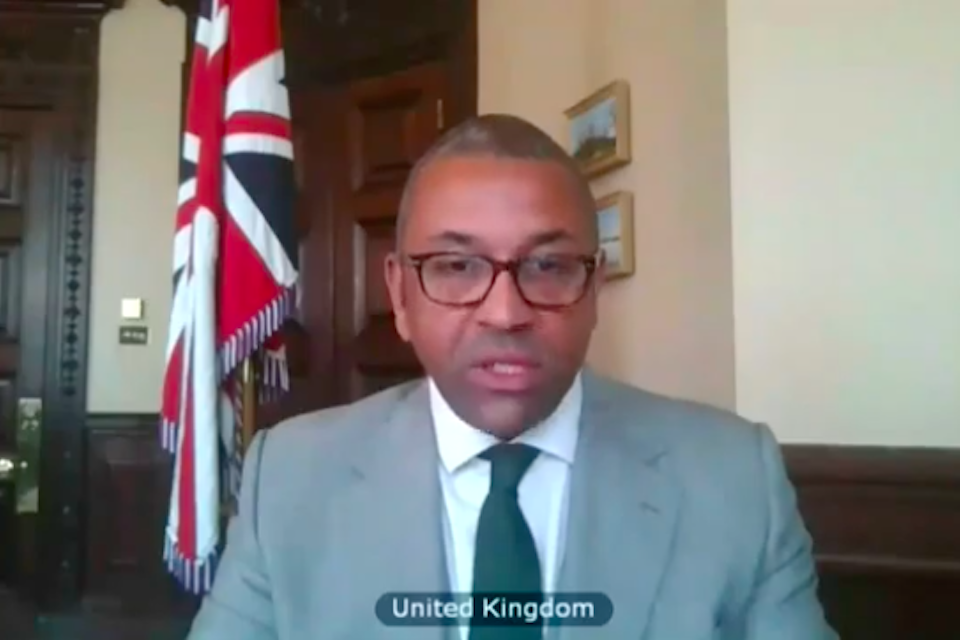Urging a negotiated two-state solution between Israelis and Palestinians
Statement by the Rt Hon James Cleverly MP at the Security Council briefing on the Middle East Peace Process

Thank you, Mr President, and thank you to Special Coordinator Mladenov and to the Secretary-General of the League of Arab States for their respective briefings.
Mr President, I address the Council today at a critical juncture.
Like many, I am troubled and frustrated by the lack of progress towards a two-state solution.
In 1947, at the end of the British Mandate over Palestine, the General Assembly confirmed the international community’s view of the need for partition into two states.
In 1993, the Palestine Liberation Organisation recognised Israel and accepted the 1967 lines as the basis for the future boundary between Israel and the Palestinian Territories.
It was a moment of great optimism.
It marked Palestinian agreement to the solution Israel itself had accepted in 1947, and confirmed the only solution that the world could see.
Despite moments of optimism, both parties have struggled to find the common ground needed for a lasting, peaceful settlement.
It has always been true that any peace settlement needs the support of both peoples.
Because a settlement, and peace, must be agreed and not imposed. But it also needs pragmatism and flexibility from both sides.
The Secretary-General, in his report on implementation of Resolution 2334, and the Special Coordinator in his briefing to the Council today, have outlined the many elements that have stalled the peace process.
We have heard about settlement expansion, increases in demolitions, seizures, and worsening settler violence.
The UK has long urged Israel to end these counterproductive activities.
Meanwhile, Palestinian militants have fired rockets and launched incendiary devices from Gaza, threatening Israel’s security.
Israelis have suffered from the scourge of terrorism and anti-Semitic incitement.
Let me be clear: the UK is committed to Israeli security. We condemn all forms of incitement and anti-Semitism wholeheartedly.
Most critically, Israel’s plans to annex parts of the West Bank pose a significant and possibly existential threat to the peace process.
The UK has been clear, in this Council and beyond, that unilateral action is unacceptable.
Annexation risks signalling Israeli rejection of the very solution Israel and the international community agreed in 1947.
As my Prime Minister said on 16 June, the UK strongly opposes annexation, which would breach international law. The United Kingdom will not recognise any unilateral attempt to change the border. Such a step would go against the rules-based international order and the UN Charter. Annexation could not go unanswered, and we implore Israel to reconsider.
Such a step has the potential to trigger regional instability, threatening Israel’s own security. It could have a real impact on Israel’s relations with the region, as well as the international community.
And let us not forget the consequences for those most directly affected: the Palestinian people.
We cannot predict the implications as a loss of hope. But we can say with some degree of certainty that it is the extremists who would benefit most.
Mr President, we have to find another way.
A lasting agreement will only be achieved by real movement towards renewed peace by negotiation; negotiations that create a viable and sovereign Palestinian state, living in peace and security side-by-side with Israel, based on the 1967 borders with agreed land swaps, Jerusalem as the shared capital of both states, and a just, fair, agreed and realistic settlement for refugees.
I address this Council today to express the United Kingdom’s willingness to stand with the Israeli and Palestinian leaderships in choosing the path of dialogue.
We do not underestimate the challenges, but firmly believe that with bold leadership, peace is possible. The UK stands ready to support all efforts to achieve a lasting and peaceful solution.
We recognise that the United States retains a key role in the Middle East Peace Process. So we urge the United States, Israel and the Palestinian leadership to find a means of restarting discussions, supported by the international community.
As I have said, flexibility, pragmatism and indeed compromise will be needed on all sides.
We understand this path is not easy, but we must do all we can to pursue a negotiated outcome.
Mr President, a peace imposed is no peace at all. It will achieve no more than to sow the seeds of future mistrust and instability. Both Israelis and Palestinians deserve better.
Despite the setbacks, the UK continues to believe profoundly that a negotiated, genuine two-state solution is the only viable means of bringing peace and stability to Israelis and Palestinians.
It is the only way to preserve Israel’s Jewish, democratic identity and realise Palestinians’ rights, including self-determination. And it is the only way to permanently bring an end to this conflict.
Thank you.